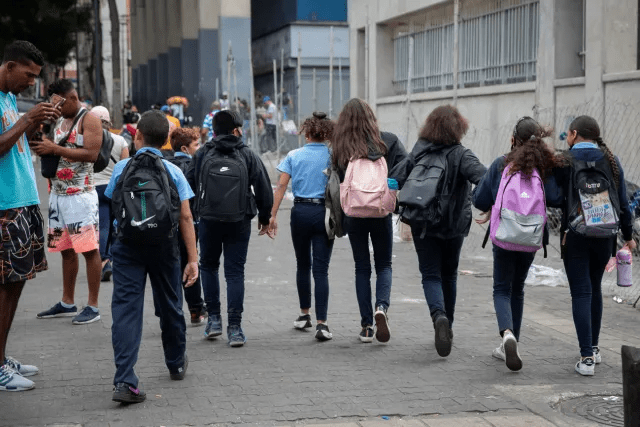
The recovery of education after two years of isolation caused by the COVID -19 pandemic, the need for quality teachers and the continuous failures in the electricity service are the main challenges facing education in Venezuela.
lapatilla.com correspondent
During the XXIV Ordinary Assembly of the National Association of Private Educational Institutes (ANDIEP), held in Carabobo State, the President of ANDIEP in the region, José Manuel Bolívar, highlighted that the consequences left by the pandemic in the educational sector is a continuing issue that is still under work.
He specified that, at some levels, there are students with difficulties in the area of reading, basic mathematics and social skills. “There was a lot of learning loss and we are still working on recovering that learning,” he reiterated.
In addition, he explained that there has been a decrease in the number of educational professionals who graduate from different universities, which is why they are concerned about how difficult it may be to have trained educational personnel in the future.
“A great challenge we also have is to have higher quality teachers and to have young people who fall in love with the profession. The faculties of education have fewer and fewer students, that is a great concern for the future of the country, that is one of the things that we can work together with the governing bodies to be able to guarantee educational quality looking towards the future,” he pointed out.
Added to the factors that affect the learning process are the repeated electrical failures. “The rhythm is lost, the ability to be efficient in the classroom, to have lighting, the use of technology, all of that is impacted by the daily electrical failures,” said Bolívar.
On the other hand, the President of ANDIEP in Carabobo State indicated that in recent years the number of students in schools has been reduced between 25% and 30%, mainly caused by migration abroad.
He stated that despite all the challenges they face, ANDIEP is committed to quality education for all Venezuelans. “We are always willing to work with the Ministry of Education, to offer our expertise in the projects we develop for the benefit of the education of all Venezuelans,” he said.
Monthly tuition
Regarding the increase in monthly tuition, Bolívar mentioned that they are analyzing all the variables, taking into account inflation and the financial difficulties of Venezuelan families.
“We have had a very tough year economically, I’m not just talking about schools, I’m talking about all families and Venezuelans. This means that we view any administrative and financial process for next year with great caution and with a very detailed analysis. I believe that we still have about three months left to plan, to evaluate how the economy is going and to what extent we can improve the salaries of our teachers, which is our main expense,” he stated.
For her part, the national president of ANDIEP, Nellis Sánchez, explained that the price of monthly tuition in private schools varies according to the educational projects of each institution, which makes it impossible to establish standard amounts. Likewise, she highlighted the necessary investment in technology and in the preparation of personnel to adapt to new resources.
Presentations about education
The XXIV Ordinary Assembly of the National Association of Private Educational Institutes (ANDIEP) brought together representatives of the educational field from 14 states of the country on Thursday, April 18th.
At the event, presentations were made on different aspects of education, neuro-education, the economic situation of Venezuela and the business sector.
“Our challenge has had to do with the quality of education, all our educational institutions are committed to their mission and carrying out their work in favor of education,” stated the national president of ANDIEP.
For his part, the president of ANDIEP in Carabobo took the opportunity to announce that ANDIEP is developing the Learning Research Center, an important initiative for the development of evaluation standards that allows to show the progress and achievements of private education in key areas such as language and mathematics. This initiative seeks to demonstrate the value of investment in education and the commitment of families to the comprehensive education of their children.
New primary school curriculum
The Minister of Education, Yelitze Santaella, was present at the assembly and highlighted that work is being done on the creation of the new primary school curriculum and that, given the situation of the lack of continuity of studies towards an university education, plans related to the productive engines of the country have been included. This has allowed, for example, in oil producing states, to graduate students as professional hydrocarbon technicians.
To do this, she said that it is very important for students to learn another language, such as English, in addition to their mother tongue, which is why they have already trained 8,000 teachers in that subject.

